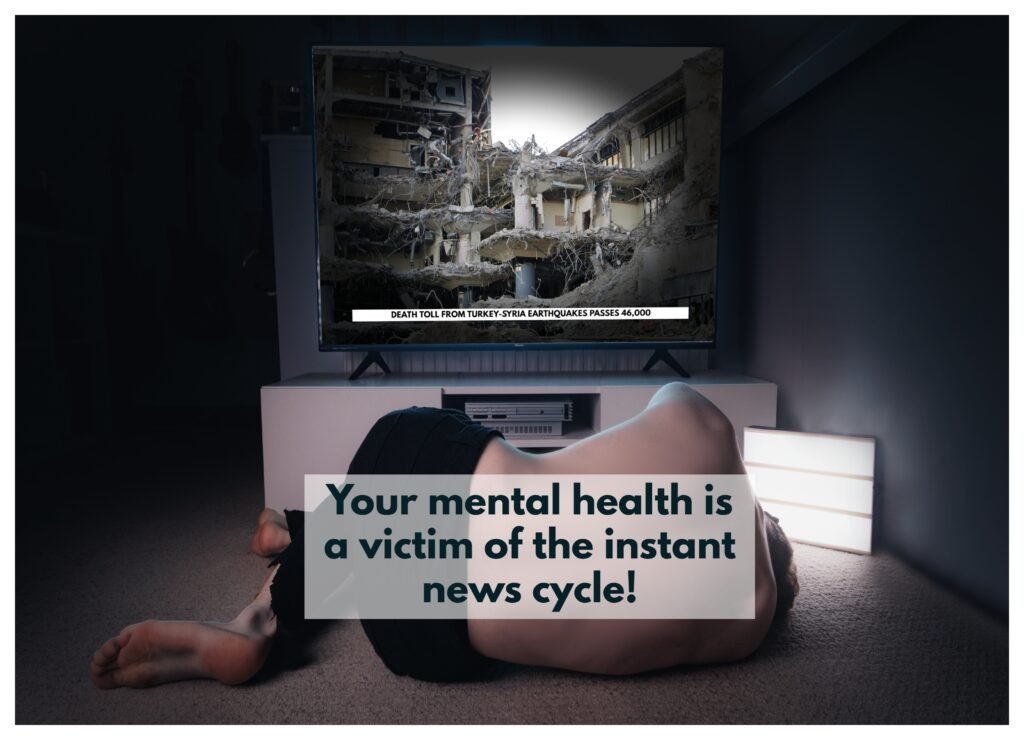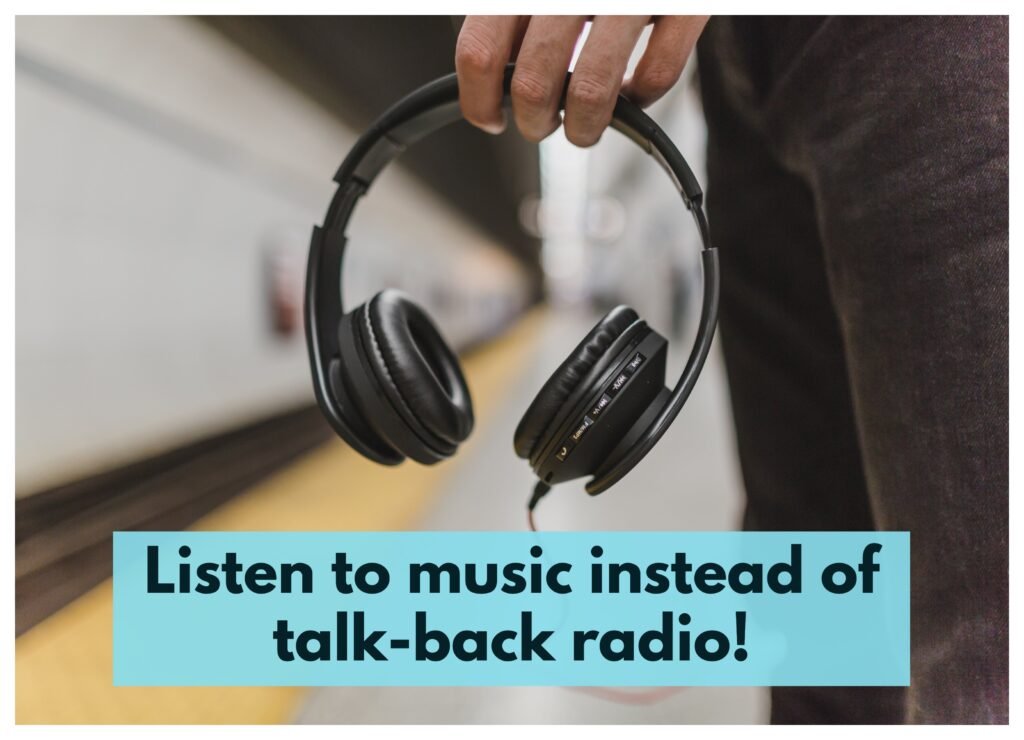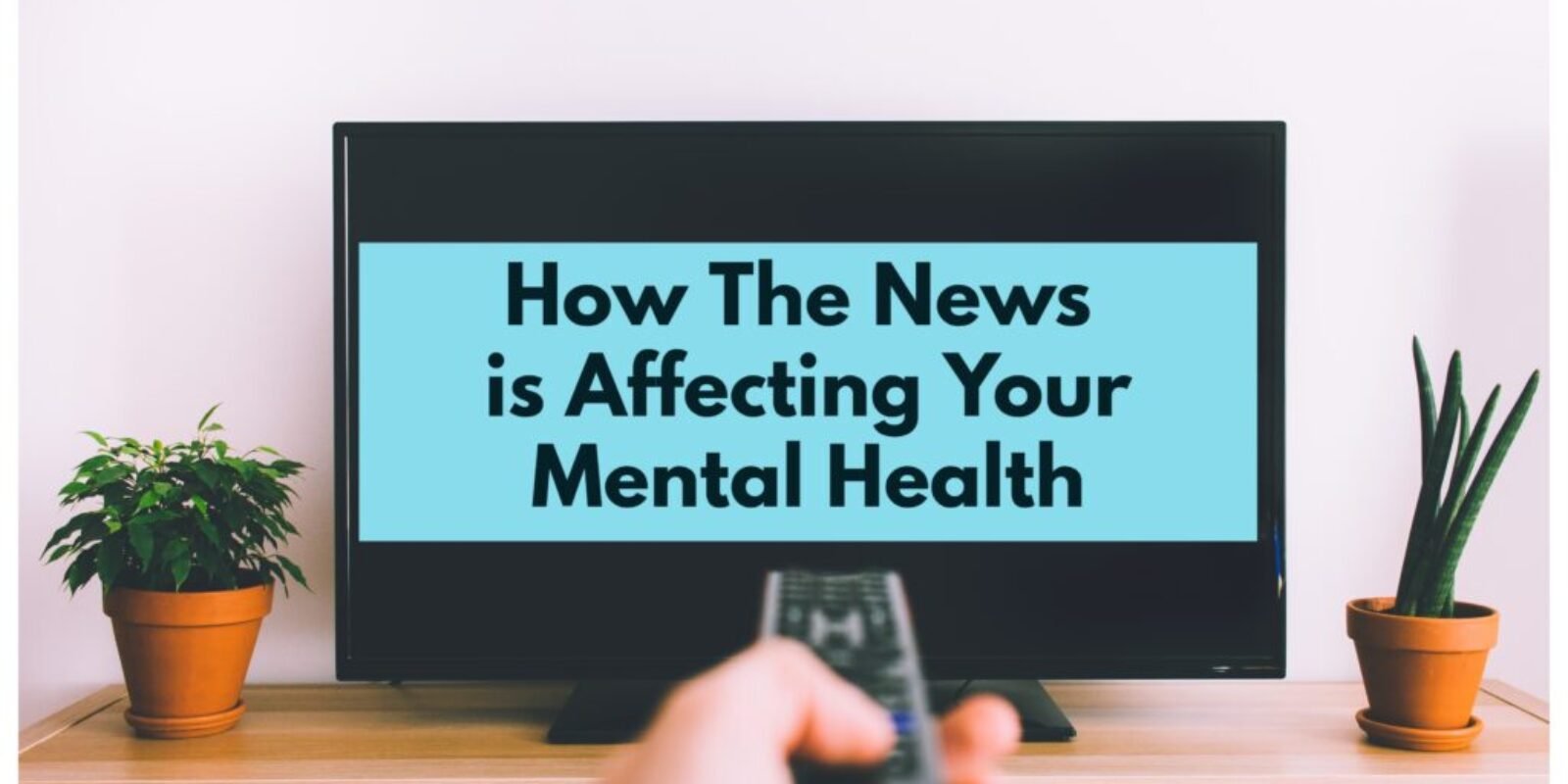Do you often feel stressed or anxious? Do you sometimes feel overwhelmed by a lot of bad news you see, read about or hear? Could the constant barrage of news be affecting your mental health? Consider this…
One-hundred fifty years ago, few, if any, New Zealanders would have received news of the recent earthquake devastation in Turkey that has claimed almost 50,000 lives. For those who did receive the news, it would have been months after the event by the time the news travelled overland and by ship.
Equally, 150 years ago, it is very unlikely anyone in Turkey would hear about the unprecedented cyclone and subsequent flooding that struck New Zealand’s North Island last week.
Today, news travels at the speed of light. It takes milliseconds for people in New Zealand to get news from Turkey and the same for Turks to hear about New Zealand’s woes. And that news is there in front of you from multiple sources… television, radio, those newspapers that still exist and, of course, the ubiquitous internet. And this latter will feed it to you through even more sources including social media and video sites like YouTube where you can visually experience the heartbreak!
Your Mental Health Is A Victim of The Constant News Cycle!
Stop and think for a moment… how many ‘good news’ stories have you read today? How many headlines about violence against individuals and nations? About the coming economic apocalypse? About the impending Armageddon resulting from global warming?

Yes, it’s important to know what’s happening but where is the balance? For every good news story, there are 100 that will add to your mental discomfort.
Do you really need to see article after article, image after image, video after video of people being pulled from the rubble of collapsed buildings? Or a twice-daily reminder of how home ownership has become an impossible dream for millions of families?
Prefer to listen rather than read?
What Is All This Negative News Doing to Your Mental Health?
Everything we see, hear, feel, or experience affects us one way or another. News articles are no exception.
A recent survey conducted by the American Psychological Association found that, for many Americans, the news causes stress. Many report losing sleep over bad news. Others describe feelings of anxiety, fatigue, and other issues that are of direct consequence to mental health.
Yet, one in 10 adult Americans check the news every hour. Fully 20 percent of Americans report “constantly” monitoring their social media feeds. This exposes them to the latest news headlines, whether they like it or not.
“The way that news is presented and the way that we access news has changed significantly over the last 15 to 20 years,” says Graham Davey, a professor emeritus of psychology at Sussex University in the UK. “These changes have often been detrimental to general mental health.”
Davey says today’s news is “increasingly visual and shocking.” Bystander-recorded videos posted on the internet can be so graphic that they can cause mental health issues such as high acute stress or even PTSD, he adds.
This problem is multiplied many times over each day, every day, all over the world. So much so that even those who may not consider themselves avid news consumers find themselves bombarded with the latest events and developments, shaping their perceptions and attitudes toward current affairs.

Why Do We Obsess Over Bad News?
Despite the risks to mental health, a number of studies offer convincing proof that people are inclined to obsess over bad news. How this came to be seems to be a matter of genetics and evolution. Mental health experts say our brains are hardwired to pay attention to bad news.
How Bad News Affects Mental Health and Overall Well-Being
That said, some of Davey’s research also indicates taht negative TV news can cause unwanted alterations to a person’s mood. No matter how happy and content you might be, bad news hits us all the same way.
Invariably, in one degree or another, bad news causes us to experience sadness and anxiety. While anxiety and stress should be reason enough for any senior to be cautious of indulging in bad news, these mental health afflictions can also cause physical illness.
Scientists have long known that the stress-related hormone cortisol can lead to inflammation associated with rheumatoid arthritis, heart disease, and other serious health concerns.
As well-established as these facts are, for many older people, the question still hangs, ‘If bad news has such a serious impact on mental health, why do we keep coming back for more?’

Is It Time to Refocus News to Achieve Better Mental Health?
One of Australia’s most respected journalists and television presenters, Leigh Sales, was recently quoted as saying:
“I think we need to reconsider the nature of “news” and I don’t have any easy answers for this. But I think the traditional model of the news is contributing to the mental health crisis in this country.
The nature of news is that it emphasizes the aberration or the rare occurrence over the most likely outcome. So, for example, 200 helicopters fly safely on any given day and the one that crashes makes the news.
That was fine back in the days when people saw one TV news bulletin per day or there was one daily newspaper, but now with social media and 24/7 news, you might see 25 references per day to that helicopter, complete with detailed images.
I know from research I did for my book, Any Ordinary Day, that to the human brain, that feels like 25 helicopters crashed, not one. I believe that the news is making people fear things they don’t need to be fearful of. It gives people a skewed sense of what is actually dangerous in life.
Let me give you an example: 3,747 Australians died of catastrophic falls in 2021, according to the Australian Bureau of Statistics (by contrast, COVID deaths were 1,122). I guarantee the possibility of a fatal fall is not front of mind for most people, even though it is one of the most common causes of death in Australia.
But if every single day, the media started covering the 10 people who had died in falls, and we had their families crying on TV and calling for action. We had “experts” going, “We have to do something about all the people dying from accidental falls,” I’m sure it would spark mass public anxiety. People would start thinking they were at significant personal risk of dying from a fall and suddenly we’d be seeing politicians announce non-slip floor mats are mandatory everywhere and there would be new regulations for shoe soles and so on.
The other thing that I think causes the public unnecessary anxiety is the over-emphasis on doomsday predictions on the opinion of one so-called “expert”. It’s the equivalent of crystal-ball gazing and we need to stop treating it as if it’s news. Those kinds of stories are endemic. “Housing prices set to fall 25 percent” will scream the headline. Then you read on and the fortune-telling is based on one person’s opinion. The story will also neglect to mention that it’s a 25 percent worst-case scenario prediction off the back of a year of crazy 30 percent price rises.
There’s plenty to be anxious about in life without the unnecessary fearmongering. Like I say, there are no easy answers to this. But we journalists need to think about it, otherwise, people are going to turn their backs on the news media increasingly.”
Will Avoiding News Improve Your Mental Health?
There is a simple reality… bad news sells while good news doesn’t. In other words, don’t look to the media barons and their publications – including Facebook, Twitter, YouTube, et al, to change their ways. It ain’t gonna happen in your lifetime or mine!

So that leaves you with a single option if you agree that the constant bombardment of bad news is affecting your mental health… self-discipline! You need to be your own censor by deciding when and where to get your news. It’s not going to be easy because you have an entire industry trying to get you to see more, not less news. But your mental health and even physical well-being depend on it.
Five things you can do to minimize the news cycle impacting your mental health:
1/ Donate Time, Money, or Other Resources
It may sound counter-intuitive to dive deeper into bad news, but actively do something to help change the entire focus of the event. For example, we all know that our oceans are swimming in plastic litter. Instead of focusing on the problem, focus on the solution by picking up litter wherever you see it.
Another example would be to donate any amount to the relief appeal for victims of that Turkish quake. Even a dollar or two will make you feel that you are helping and that will allow you to mentally refocus by feeling positive about your response!
You will know that your actions – no matter how small – are making a difference. The following story is worth remembering when you feel that you are not able to do enough:
A young boy and his grandfather were walking along a beach. As they walked they could see thousands of stranded jellyfish left high and dry as the tide receded. As they walked, the young boy continued to bend down, pick up a jellyfish and throw it back in the ocean. After the 6th or 7th rescue, the grandfather asked the boy,
“Why are you bothering? There are thousands here. What difference does it make if you throw a few back?”
The boy bent down and picked up another one and, as he threw it back into the ocean, replied…
“Well it sure made a big difference to that one!”
2/ Read News Summaries That Don’t Show Images or Video Footage
We are a visual species. Our eyesight has developed over millennia to protect us from predators and other dangers. Our visual cortex, the part of the brain that interprets what we see, is very highly developed compared to most other species. In other words, what we see is critically important.
When you look at an image of a fatal vehicle accident, your brain senses the danger component. It may even indirectly lead to an increase in cortisol, the stress hormone.
Words, on the other hand, are interpreted very differently from images or videos. We are more analytical in our response.
3/ Don’t Play ‘Groundhog Day’ With News Articles
You’ve seen it, you’ve read it, so why read or watch different versions of the same story? The fundamentals won’t have changed. All you are doing is allowing that constant news cycle to affect your mental health.
Yes, it may be important to be informed but there are very few non-local events that require frequent attention.
4/ Put Self-Care Front and Centre Again
Was there a time when you seemed to have had more opportunity to do the things that made you feel better about yourself and your life? A time when you read for pleasure? Maybe a time when you went for an extended walk, listening to birds singing while you admired gardens?
Why not track how much of your life is currently focused on the news? You might just find where all that time is disappearing. Do you wake up and check the news? Do you check it during the day? Again, at night? How many times a day are you checking your social media feeds? Not only is that time you will never recover, but it might also just be impacting negatively on your mental health.
5/ Listen to Music Instead of Talk-Back Radio
Many of us like to have ‘noise’ in the background as we go about our daily schedules. For some, it’s talk-back radio while others prefer a 24-hour news channel. If you’re listening to either, consider changing to a music channel. You will gain an immediate boost in serotonin simply because music soothes while news agitates.

Put Your Mental Health Front and Centre by Opting out of the News Cycle!
It’s your life and your health so it’s your decision. But how much of the news you are currently reading and/or watching actualy matters to you? Can you bring that person back to life? Can you turn back that flood or reverse that earthquake?
The news cycle is designed to agitate. If you do nothing different, you are allowing yourself to become a victim. As you have read above, there are ways to reduce the impact of news on your mental health. What will you choose to do now?
Disclaimer
The content provided on MySeniors.World is for informational purposes only and is not intended as either financial or medical advice. Always consult a qualified professional before making any investment or health-related decisions.
Posts may contain affiliate links, meaning we earn a commission – at no additional cost to you, if you click through and make a purchase. Your support helps us continue providing valuable content.



















